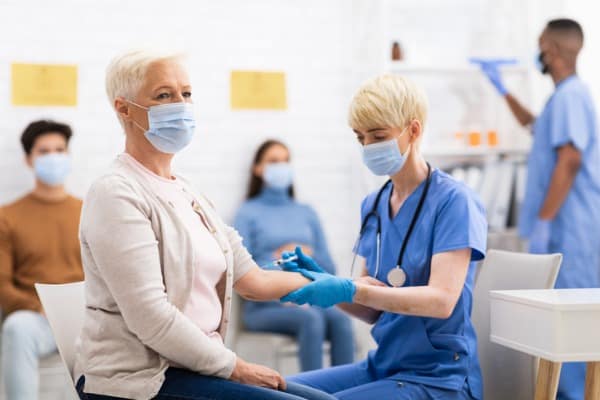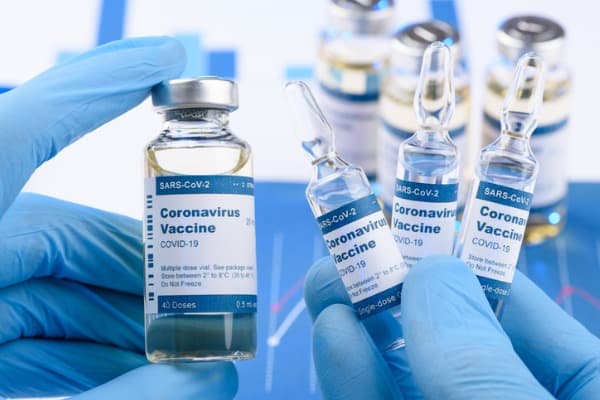Quick Navigation
1. What Covid-19 Vaccines have been approved?
Vaccines by both Pfizer and Moderna have been approved. Whilst they do contain a fragment of Covid-19’s genetic code they do not alter the genetic code of the person taking it.
Nearly all the doctors at HealthTap.com, around 96% to be precise, are of the opinion that these vaccines are both safe and effective.
Pfizer
Data has shown that this vaccination starts providing immunity to Covid-19 almost immediately after it has been administered. People aged 16 years and older can take it and need to have two doses taken twenty-eight days apart.
It has an efficacy rate of around 95%, seven days after the second dose. In other words, approximately 95% of people who have had this Pfizer innoculation will be protected from becoming seriously ill from Covid-19.
Moderna
Data has shown that this vaccine has a slightly lower efficacy rate of 94.1%. People aged 18 years and older can take it, with two doses required to be taken twenty-eight days apart.
The Coronavirus surface has a spike type structure, referred to as an S protein. Both vaccines work by using messenger RNA (mRNA) to provide instructions to cells to create a harmless piece of an S protein, which then attach to the cell surfaces.
Your immunity recognizes the antibodies as foreign and thus creates antibodies to fight Coronavirus.
2. Are these Covid-19 Vaccines Safe?
These vaccines have been in clinical trials, just like others still undergoing trials themselves. Before the public is offered these vaccinations, the FDA reviews all the data from these trials.
They have to do this to determine how safe they are before approving them safe to use.
The FDA has been giving emergency use authorization to Covid-19 vaccines because of the urgency caused by the Covid-19 health crisis. This does not mean that safety has been compromised, despite less data currently being used than usually normal.
The FDA must be satisfied that the data presented to them demonstrates that the vaccines are safe and effective for use amongst society.
3. Can I still have the Covid-19 Vaccine if I suffer from Allergic Reactions?
This can depend. The following factors might play a role:
- If you previously have had an allergic reaction to a vaccine or any injectable medication, seek guidance from your doctor about whether you are able to have a Covid-19 vaccine.
- If you have a history of suffering severe allergic reactions not related to a vaccine or injectable medication, you can have a Covid-19 vaccine but will require monitoring for 30 minutes thereafter.
- Suppose you have had an allergic reaction to any of the ingredients contained in any of the Covid-19 vaccines. In that case, the Centers for Disease Control and Prevention recommends avoiding the vaccine that contains the specific ingredient you are allergic to.
- If you are allergic to polysorbate, avoid having an mRNA vaccine completely.
- If you have an allergic reaction after the first dose of a Covid-19 vaccine, do not have the second dose.
If in doubt, always seek advice from your doctor beforehand.
4. Are there any possible Side-Effects of these Vaccines?
There are typical side-effects that can occur after either the first or second dose of your Covid-19 vaccine. They typically occur within the first three days of having the injection, lasting a few days, and include:
- pain, redness, or swelling on or around the site of the injection
- fever
- fatigue
- headache
- muscle pain
- joint pain
- chills
You more than likely will be monitored for up to fifteen minutes after your injection to see if you experience an immediate reaction.
Please also bear in mind that many of the side-effects are similar to Covid-19 symptoms.
However, if you have been exposed to Covid-19, experience symptoms after three days of your injection and they last for more than two days, self isolate and get tested.
5. Can everyone have one of these Covid-19 Vaccines?
Not everyone can, unfortunately, at present, including:
- If you’re pregnant and/or breastfeeding and fall within a category that has been advised to have a vaccination, seek the advice of your healthcare provider.
- This is because there has been no research conducted in either circumstance to determine the safety of doing so.
- Children under the age of 16 years.
- People with certain health conditions.
Always seek medical advice if you’re unsure about having a Covid-19 vaccine, as the above can be subject to change.
6. Do I need to take precautions after having a Covid-19 Vaccine?

The Centers for Disease Control and Prevention recommends that precautions are still taken after having a vaccine. These include:
Face Coverings in Public
Whenever out, particularly if you cannot maintain social distancing, like if you’re in a small shop, always wear a mask or face covering. It provides you with some degree of protection that could make a difference.
Maintain Social Distancing
Always attempt to stay at least 2 meters away from others, when possible. You may want to avoid traveling or shopping at peak times if you can to ensure this. It is even more important if you have a serious illness or condition that leaves your immune system compromised.
Practice Good Hygiene
Wash your hands regularly, particularly when you come into your home. Lather your soap or hand wash with your hands for twenty seconds for it to be effective. Alternatively, you can use a hand sanitizer that contains at least 60%b alcohol.
- Cover your mouth and nose when you sneeze, chucking away the tissue immediately after.
- Avoid touching your eyes, nose, and mouth.
- Avoid sharing any household items if you’re unwell. Try to keep to one area of your home and keep rooms well ventilated.
- Clean and disinfect your work surfaces daily.
Stay at Home if you’re Unwell
Unless you’re seeking medical attention, stay home until you’re well. This is to prevent you from passing on your illness to someone else or becoming more ill.
The Covid-19 pandemic has forced many of us to reassess how well we look after ourselves, including our mental health when isolating.
With the introduction of various vaccines, we may now be coming towards a point in this pandemic whereupon we can begin to look forward to life beyond it.
However, we still need to be cautious and take heed of medical advice to make sure we do not take things for granted or take steps backward. With advice constantly changing, it is important to focus on what the medical profession states as reliable sources of Covid-19 advice.

